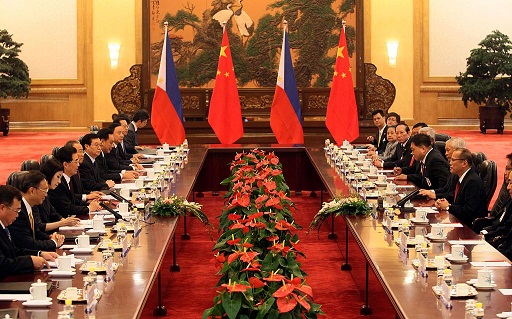 Enriched by having dealt with issues at close range and without the restrictions of toeing the government line, former government officials usually are the voice of wisdom on current issues.
Enriched by having dealt with issues at close range and without the restrictions of toeing the government line, former government officials usually are the voice of wisdom on current issues.
Such was speech of former Foreign Secretary Roberto R. Romulo (Ramos administration) at the Manila Times Business Forum last Wednesday on Philippine –China relations which he described as “at a historic low.”
Romulo said there is no magic solution to the strained relations between the two countries.
He sagely preached the virtues of patience, perseverance, recognize the importance of “face” and appreciate what is going on internally in China.
These are actually basics in diplomacy and one wonders why President Aquino and Foreign Secretary Albert del Rosario ignored them.
Romulo shared more insights: “Avoiding harsh rhetoric and maintaining a level of subtlety and restraint even when addressing domestic audience would be helpful.
“Aligning ourselves with the U.S. and Japan and getting world opinion makes a great deal of sense but should not be done in a public and provocative manner that will arouse hawkish reaction and fuel nationalism from the other side.
“Flexibility is also called for – in our position and in our mode of negotiations – something which Vietnam has done very well with. We should be careful not to paint ourselves into a corner much as China has done with its nine-dotted line argument.
“Finally, we should speak with one voice but we must also use alternate channels of communicating with the Chinese side.
Here are excerpts from the speech. Read on and be enlightened:
“Why should we care to bring our relations to normalcy? China’s inexorable rise as the preeminent power in East Asia is a reality that we have to accept and hence engagement and mutual-accommodation is unavoidable. With China becoming a global economic superpower, it will have enormous influence on our economic well-being – as a market for our products, as a crucial source of investments, and of technology. And so while it is correct to evoke principles of international law to condemn China’s perceived “bullying” behavior, it must not be forgotten that the goal of diplomacy is not about gaining moral victory but rather achieving an outcome that promotes the national interest. Given the importance of China to us means following a course that allows us to manage tensions, re-build ties, and envision a future marked by cooperation rather than conflict.
“Why should China care to avoid tension and bring our relations back to normal? Violent confrontation and bullying behaviour will damage the image it has carefully nurtured over the years as a good neighbor focused on developing its economy. It will have a chilling effect on relations with ASEAN and will certainly make China in the eyes of the U.S. and Japan a hostile nation that cannot be trusted to follow international norms of behaviour and therefore needs to be contained. This in turn will do great harm to China’s economy and threaten its leadership’s longevity in office.

2011 bilateral talks between Pres. Aquino and Chinese President Ju Hintao, two years before the Philippines filed a case against China at the U.N. Since then, no bilateral talks between China and PH.
“So how do we go about creating an environment where compromise is possible and nobody loses face? My view is that the first step is to clarify the issues that are driving the competing claims of sovereignty over these rocks and shoals. Only by understanding the dynamics in place can appropriate responses be developed. For China, there are two outstanding issues here: one is access to energy resources and the other is strategic concerns. The recent crises in northern Africa and the Middle East have raised concerns about supply stability. Distance from sources also means the long shipping route makes them vulnerable to disruption. Under these circumstances, it has become imperative for China to search for oil closer to “home”.
“The strategic concerns have to do with guaranteeing China’s unhampered access to the Pacific and Indian Oceans where ships carrying its exports pass on their way to markets and where tankers and bulk carriers laden with its imports of oil and minerals sail through on their way to Chinese ports. China wants to have the ability to control passage through the South China Sea rather than leaving it to the de facto guarantor of freedom of navigation there – the United States with its 7th Fleet. States adjacent to the South China Sea are wary of China’s intention and see that of the U.S. as more benign.
“The Philippines likewise needs the hydrocarbon believed to be under the waters of the South China Sea. But since the extent of this resource is still unproven it is driven more by the more immediate goal of protecting its territorial integrity and preserving its traditional fishing grounds. For the Philippines, it sees China’s aggressive actions in the area as one of invasion and occupation thus stoking high emotions and patriotic fervor. Vietnam shares the same aspirations and fervor but with one important difference. What complicates our position is that because of our lack of military wherewithal to defend our claims, we have unabashedly invoked the American mantle of protection, thus inconveniently placing us squarely on the U.S. side of the freedom of navigation equation.
“That is a just and popular cause as I mentioned earlier except that from Chinese view we have become an accomplice of what they perceive as part of a strategy to bottle them up – with us in the south and with Japan in the north – thus giving them another angle to justify their actions. Vietnam is not similarly encumbered and so having the luxury of not taking sides it has the flexibility to tailor its response to China’s actions in the disputed waters.
“Aside from these substantive issues, it would also be well to understand China’s current internal political dynamics. We don’t need to accept it but recognizing them helps to calibrate our response. First, we should not make the mistake that the notion of indisputable sovereignty over the South China Sea is solely attributable to China’s leaders or ideologues. To quote one Sinologist: “There is near-universal support among China’s public for its claim over this large area , with little understanding of the principles of contemporary international law, continental shelves, or exclusive economic zones. Instead, Chinese public support for these claims has developed through the education system, where students are taught that Chinese authority over this area extends back to the Chin Dynasty. Despite the weakness of historical claims, they have a strong hold over the imagination of the public and this support makes it impossible for any Chinese government to make concessions on what are considered issues of sovereignty. Compromise in this situation would be perceived as a betrayal of national sovereignty.”
China President Xi Jinping is quickly consolidating his power since he took over from Hu Jintao in 2013. Given the current state of the public mindset on the Spratly Islands issue, it would be difficult to imagine a major shift in China’s position on this issue until the new leadership is confident enough to make bold decisions that run counter to long held beliefs without being run out of office. “
Click on the link below for Romulo’s full speech:




